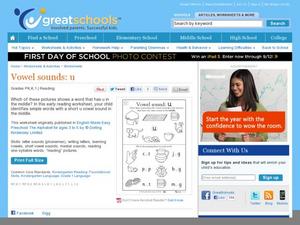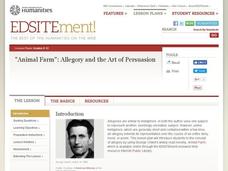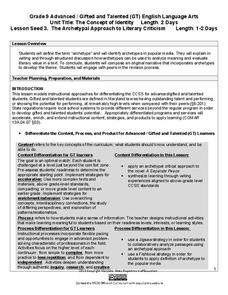El Paso Community College
Geometry Definitions
Geometry is full of shapes, figures, and corresponding things here and there. The guide shares all of the key pieces of geometric information in a nicely color-coded and labeled sheet.
Curated OER
Gotham Equinox
By looking at the direction of the parallel streets of New York and figuring which days the setting sun is directly visible along those lines, your class can calculate the degree and angle of the sun. A really nice lesson, giving a...
Curated OER
Roman Republic
Experience the birth and rise of the Roman Empire with these slides, which include explanatory maps and pictures. Details of the Roman government draw an easy parallel to the American government, which could start an engaging discussion.
Curated OER
Light
All aspects of the path of light are included in a great summary. Internal reflection and the angles of paths in different materials are explained and the behavior of visible light through lenses and the effect on focal points are...
Curated OER
Vowel Sound: u
Which of these have /u/ as a middle sound? There are images of seven CVC words surrounding the letter u here, and scholars draw lines from the letter to words with the same middle phoneme. Be sure they know what these images are...
Curated OER
KWHL Questioning Strategy for Briar Rose
Whether new to the KWHL strategy or not readers of Briar Rose will benefit from the detailed procedures and templates designed for Jane Yolen’s novel. Links are provided for research into the Holocaust and activities reveal the many...
San Francisco Symphony
By the Great Horn Spoon!
By The Great Horn Spoon is a fantastic novel for introducing learners to life during the California Gold Rush. First, kids research and analyze American folk songs, then they connect to the text as they listen to symphonic pieces written...
Curated OER
Life, Death, Dirt, & Walt Whitman
Walt Whitman was a composter? Certainly the cycle of life and death he describes in "Leaves of Grass" parallels the processes going on in a compose pile. The interdisciplinary approach detailed here could be used to foster a deeper...
Illustrative Mathematics
Area of a Trapezoid
Here is a straightforward example of how to apply the Pythagorean Theorem to find an unknown side-length of a trapezoid. Commentary gives additional information on proving that the inside of the trapezoid is a rectangle, but is...
Friends of Fort McHenry
Was the War of 1812 Our Second War of Independence?
Though it occurred almost 40 years later, could the United States have been fighting for their independence again in the War of 1812? Using appropriate primary source material from each of the two wars, compare and contrast the situation...
National Endowment for the Humanities
Animal Farm: Allegory and the Art of Persuasion
Introduce your class members to allegory and propaganda with a series of activities designed to accompany a study of George Orwell's Animal Farm. Readers examine the text as an allegory, consider the parallels to collective farms...
Mr. Roughton
Roman Empire
Does the United States parallel the Roman Empire in any way? Young historians work with four documents in order to answer this query as part of a structured DBQ assignment.
Curated OER
Paradise Lost: Picture Book Activity
Readers of Paradise Lost draw parallels between Milton's tale and Gene Zion's Harry the Dirty Dog, an illustrated children's book.
Sociology Central
Society Is Like...
To introduce the idea of different theoretical views about the nature of society, class members engage in a sociology activity that asks them to create an analogy between society and another concept, and then to explain the parallels.
Maryland Department of Education
The Concept of Identity Lesson 3: The Archetypal Approach to Literary Criticism
As class members continue their study of approaches to literary criticism, readers examine the symbolism and archetypal patterns in John Knowles' A Separate Peace, and how these parallels are used to develop a theme...
EngageNY
How Do Dilations Map Angles?
The key to understanding is making connections. Scholars explore angle dilations using properties of parallel lines. At completion, pupils prove that angles of a dilation preserve their original measure.
Houghton Mifflin Harcourt
Unit 6 Math Vocabulary Cards (Grade 3)
A set of 49 math vocabulary cards ranges from angle to irregular polygon to parallel lines. Each sheet contains two cards: one with the word printed in bold text and the other with the definition.
Curated OER
Vectors
Represent motion with arrows and call them vectors! The lesson is a presentation that models the mathematics involved when determining a resultant vector. It addrssses motions that are parallel, perpendicular, and a combination of...
EngageNY
Construct a Perpendicular Bisector
How hard can it be to split something in half? Learners investigate how previously learned concepts from angle bisectors can be used to develop ways to construct perpendicular bisectors. The resource also covers constructing a...
PHET
Capacitor Lab
The first capacitor was a Leyden jar, invented in 1745. Physics scholars explore capacitors in an engaging simulation. They may view one or set up circuits which contain two to three either in series or parallel. Other views include...
Texas Education Agency (TEA)
Architectural Rendering
Explore different methods of architectural rendering and technical drawing. Pupils learn about cross hatching, parallel line rendering, random line rendering, rubbing, shading, and stippling in the second lesson of the series of 11....
National Gallery of Art
Islamic Art and Culture
Provided by the National Gallery of Art in Washington, this resource for teachers examines Islamic art, including calligraphy, arabesques, and geometric designs. A recounting of the spread of the faith and the tumultuous political...
EngageNY
Grade 9 ELA Module 4, Unit 1, Lesson 28
As writers continue to revise their argument essays, the focus shifts to editing grammatical conventions, parallel structure, and varying syntax to add interest. After examining model sentences that demonstrate sentence variety, writers...
PBS
Using Primary Sources: Nazi Spy Ring Busted
Spy games are not just for professionals anymore! Scholars use short video clips, primary documents, and photographs to investigate Nazi spies in America during World War II. The young detectives analyze the paranoia warfare can...
Other popular searches
- Parallelism Grammar
- Parallelism in Writing
- Parallelism Writing
- Faulty Parallelism
- Parallelism in Language Arts
- Grammar Faulty Parallelism
- Parallelism in Literature
- Parallelism and Poetry
- Parallelism Literature
- Parallelism in Grammar
- Lack of Parallelism
- \"Grammar Parallelism\

























